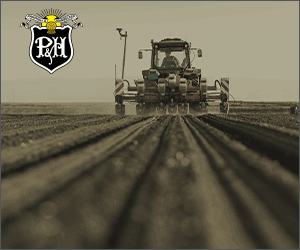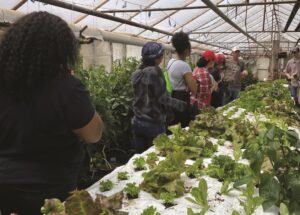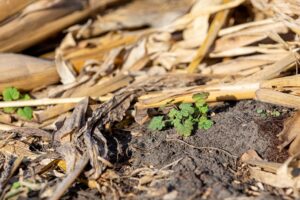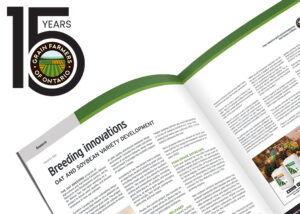The future agricultural workforce
GRAIN FARMERS OF ONTARIO LEGACY SCHOLARSHIP WINNERS
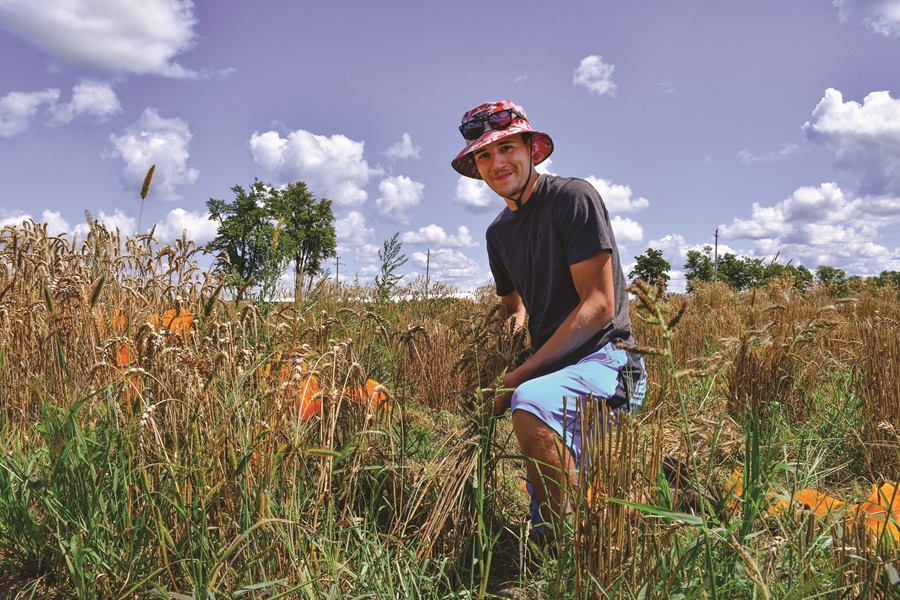
Did you know that one in every nine jobs in Ontario is tied to the agriculture and food industry?
The demand for a skilled workforce in the agriculture sector has never been greater, and Grain Farmers of Ontario is committed to fostering the success of the next generation of farmers, scientists, engineers, entrepreneurs, communicators, marketers (and more!) by offering an annual scholarship program, the Grain Farmers of Ontario Legacy Fund Scholarship.
THE LEGACY FUND
The Grain Farmers of Ontario Legacy Fund provides a once-in-a- generation opportunity for the organization to reimagine and reinvest in the sector. When the Grain Farmers of Ontario Wheat Marketing was eliminated, changes in regulations allowed for the transition of the wheat marketing fund into the Grain Farmers of Ontario Legacy Fund. The original wheat marketing fund was formed using contributions from existing assets from the three founding organizations (Ontario Wheat Producers’ Marketing Board, Ontario Corn Producers’ Association, and Ontario Soybean Growers).
Now in its third year, the Legacy Scholarship encourages the pursuit of higher education, supporting students in any area of study that will benefit the Ontario grain sector or agri-food industry. Past recipients have studied in a variety of programs across the country, including communications, engineering, sciences, equipment repair, economics, and agriculture.
This year, 10 students were awarded $5,000 scholarships to support their studies. Grain Farmers of Ontario Board members reviewed 118 applications.
“Grain Farmers of Ontario is dedicated to championing the success of our agricultural community members, extending our support to students looking to make a difference in Ontario’s agriculture and agri- food industries,” says Jeff Harrison, chair, Grain Farmers of Ontario. “We were amazed by the exceptional quality of the applications we received and know that the students selected could make significant contributions to the industry.”
TELLING AGRICULTURE’S STORY
“An initial love of language led me to English studies,” says Legacy Scholarship recipient Melanie McMaster, a second-year student at Trent University. “However…I learned about communications and was instantly drawn to how it combines the power of language with business.”
McMaster hails from Hampton, Ontario, and is the fifth generation on her family farm. Studying at Trent’s Durham campus gives her the flexibility to study and continue working with her family on the farm, something that she says she loves. Taking her agricultural knowledge from the classroom to the business world, she says, is a future goal.
“The marketing, advertising, and public relations aspects of communications would enable me to join organizations like Grain Farmers of Ontario in promoting agriculture to the general public, raising awareness about farming in Ontario. Through working in communications in an agricultural industry, I desire to better establish and strengthen the connection of the public with the food source,” she says.
Brett Nagel, whose family operates a dairy and grain farm in the Ottawa Valley, is studying economics in his first year at Carleton University.
Applying his economics degree to a career in agriculture is at the top of his mind, and the Legacy Scholarship will help him achieve his goals.
“The grain industry is a very important part of our Canadian economy,” he says. “The agricultural industry sometimes gets overlooked, and I would like to improve the lives of the farming community.”
Lauren Court, an engineering student at Western University, says she first got interested in engineering as a career when her dad was building new bins on their farm in Courtland, Ontario. A local civil engineering firm designed the bins. Summer jobs in the engineering industry solidified her decision to pursue it as a career.
“Civil engineering is important for farmers being able to produce and do so efficiently,” she says. “Expansion plays a huge role in keeping up with the production demands in today’s society. I want to be able to contribute as much as I can to the growth and innovation of the grain industry in Ontario.”
FIXING WHAT’S BROKEN
Most farmers have a story about a broken-down piece of equipment during the busy spring planting or fall harvest season that can derail even the best-laid plans. Two Legacy Scholarship winners are working towards a career that will help fix those problems – or prevent them from occurring!
Ethan Ringelberg, from Troy, Ontario, and Branden Adamo, from Fonthill, Ontario, attend Conestoga College in the motive power technician – heavy duty equipment program. Ringelberg, a fourth- generation farmer, views this trade as a perfect complement to farming.
“Agriculture is a sector with job security and endless opportunities,” he says. “The knowledge and skills learned will be transferable to
enabling me to repair not only tractors and field equipment but also milking and other barn equipment.”
“I plan on being a fully licensed Red Seal technician,” says Adamo, describing his future goals. “I feel my area of study will continue to benefit the future of the Ontario grain sector and agri-food industry; without heavy machinery in good working condition, the agriculture sector would not run as smoothly and efficiently.”
FARMING FOR THE FUTURE
Taylor Legge from Chesley, Ontario, is pursuing a bachelor’s degree in agriculture, majoring in crop science at the University of Guelph.
“I see a huge need in this industry for qualified agronomists that work dynamically with farmers,” she says. “My degree in crop science allows me to understand the processes and stewardship behind on- farm decisions, and I am committed to creating a more sustainable Canadian agriculture system, both environmentally and economically.”
Colin Ormiston from Rockwood, Ontario, is in his first year at the University of Guelph, studying food, agricultural, and resource economics.
“I want to help improve and further develop the agriculture industry,” he says. “I became interested in this field because I realized how vital sustainable agriculture practices are for feeding people and protecting the environment.”
“The agricultural sector is changing fast, and we need economic analysis, business skills, and sound policies to promote sustainable practices,” he continues.
SUPPORTING GRADUATE STUDIES
Scientists are working on some of the most pressing issues facing Ontario and Canadian agriculture, and the Legacy Scholarship supports three students doing just that.
Marielle Zouein is pursuing a master’s in biology at the University of Ottawa, where her thesis work is focused on understanding the role of plant susceptibility genes in promoting Fusarium graminerarum infection, which causes Fusarium head blight (FHB).
“Recent work indicates that a plant susceptibility gene called RhohD regulates fungal DON production during infection such that expression of the DON biosynthetic genes were reduced by 90 per cent when the plant gene was not being expressed,” she says. “Understanding this phenomenon could help to develop varieties of crops that substantially reduce DON deposition in the grain, reducing the impact of FHB for Ontario grain farmers.”
At the University of Guelph, Riley McConachie is pursuing a master’s degree in plant breeding and genetics, where his current research is looking at developing new techniques to phenotype for FHB resistance in wheat using deep learning and remote sensing techniques.
“My research has the potential to be extremely beneficial for the Ontario agricultural industry,” he says. “The workflow requires very simple cell phone images, making it extremely accessible to anyone looking to employ it. This will help optimize selections within breeding programs, minimizing the time required to phenotype for resistance and helping produce higher quality wheat cultivars.”
Anibal Castillo is pursuing a PhD at the University of Guelph, studying ways to improve integrated pest management (IPM) systems. His research could help with the early detection of pests of considerable concern in Ontario, like the European corn borer, corn rootworm, tar spot, and spider mites.
“The loss of 35 per cent of crop yields globally is attributed to pre- harvest pests,” he says. “Monitoring phytophagous insect and their natural enemies are crucial for appropriate IPM decisions.”
ARE YOU INTERESTED IN A CAREER IN AGRICULTURE?
Applications for the 2025 Grain Farmers of Ontario Legacy Fund will open in the summer of 2025. Please visit the Grain Farmers of Ontario website, gfo.ca, and watch for future announcements in the Ontario Grain Farmer. •


